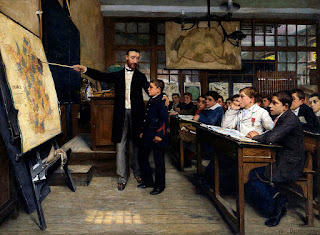Boule
de Suif (traducida como Dumpling,
Butterball, Ball of Fat, o Ball of Lard)
es la famosa historia del escritor francés Guy
de Maupassant, publicada en 1880. Es
el título para su colección sobre la guerra franco prusiana Boule de Suif et Autres Contes de la Guerre
For several days, straggling
remnants of the routed army had passed through the town. There was no question
of organized troops, it was simply a disjointed rabble, the men unshaven and
dirty, their uniforms in tatters, slouching along without regimental colors,
without order—worn out, broken down, incapable of thought or resolution,
marching from pure habit and dropping with fatigue the moment they stopped. The
majority belonged to the militia, men of peaceful pursuits, retired
tradespeople, sinking under the weight of their accouterments; quick-witted
little moblets as prone to terror as they were to enthusiasm, as ready to
attack as they were to fly; and here and there a few red trousers, remnants of
a company mowed down in one of the big battles; somber-coated artillerymen,
side by side with these various uniforms of the infantry, and now and then the
glittering helmet of a heavily booted dragoon who followed with difficulty the
march of the lighter-footed soldiers of the line.
Companies of franc-tireurs,
heroically named "Avengers of the Defeat," "Citizens of the
Tomb," "Companies in Death," passed in their turn, looking like
a horde of bandits.
Their chiefs—formerly drapers
or corn-dealers, retired soap-boilers or suet-refiners, warriors of
circumstance created officers for their money or the length of their
moustaches, heaped with arms, flannels, and gold lace—talked loudly, discussed
plans of campaign, and gave you to understand that they were the sole support
of France in her death-agony; but they were generally in terror of their own
soldiers, men "of the sack and cord," most of them brave to foolhardiness, all of them given
to pillage and debauchery.
Report said that the Prussians
were about to enter Rouen. The
National Guard, which for two months past had made the most careful reconnoiterings
in the neighboring wood, even to the extent of occasionally shooting their own
sentries and putting themselves in battle array if a rabbit stirred in the
brushwood, had now retired to their domestic hearths; their arms, their
uniforms, all the murderous apparatus with which they had been wont to strike
terror to the hearts of all beholders for three leagues round, had vanished.
Finally, the last of the
French soldiery crossed the Seine on their way to Pont-Audemer by Saint Sever
and Bourg-Achard; and then, last of all, came their despairing general tramping
on foot between two orderlies, powerless to attempt any action with these
disjointed fragments of his forces, himself utterly confused and bewildered by the downfall of a people
accustomed to victory and now so disastrously beaten in spite of its
traditional bravery.
After that a profound calm,
the silence of terrified suspense, fell over the city. Many a rotund bourgeois,
impotent by a purely
commercial life, awaited the arrival of the victors with anxiety, trembling
lest their meat-skewers and kitchen carving-knives should come under the
category of arms.
Life seemed to have come to a
standstill, the shops were closed, the streets silent. From time to time an
inhabitant, intimidated by their silence, would fly rapidly along the pavement, keeping close to the walls.
In this anguish of suspense,
men longed for the coming of the enemy… (Boule
de Suif, by Guy de Maupassant)
 |
| Schoolteacher pointing the loss of Alsace-Lorraine |
Vocabulario
meat-skewer: a
long pin of wood or metal for inserting through meat or other food to hold or
bind it in cooking.
Vocabulario reemplazado
Foolhardiness debauchery dazed
emasculated flit
Para
saber
Rouen
es una ciudad a orillas del rio Siena en el norte de Francia. Es la capital de Normandía.
Anteriormente fue una de las ciudades más prósperas de la Europa medieval.
Artículos relacionados
The Necklace, short story by Guy
de Maupassant
De
la web
Movimiento
Poder Negro, Stokely Carmichael,
Malcolm
X y Martin Luther King Jr. tratan de cambiar la sociedad norteamericana.
No hay comentarios:
Publicar un comentario
Deja aquí tus mensajes, comentarios o críticas. Serán bienvenidos